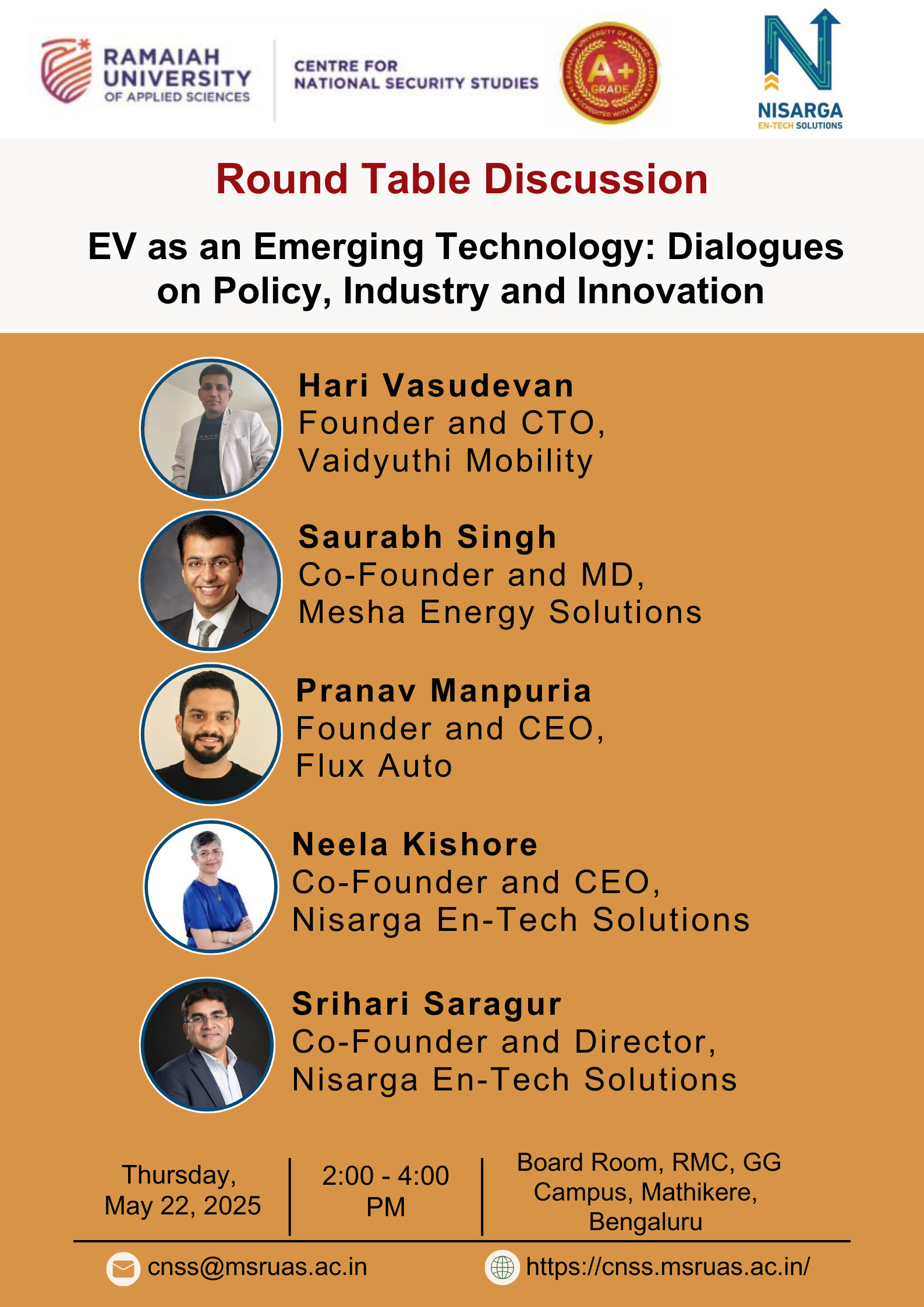Happening
Roundtable Discussion on “EV as an Emerging Technology”
Electric Vehicles (EVs) are reshaping the global transportation landscape, giving rise to new markets and value chains. Driven by national commitments to net-zero emissions and energy security, countries are increasingly undergoing EV adoption within their national energy strategies to reduce fossil-fuel dependence and to establish leadership in next-generation technologies. Electric mobility has emerged as a key aspect in India’s energy transition, with significant implications for national security. Recognising this, the Government of India has prioritised EV adoption through key initiatives such as the National Electric Mobility Mission Plan (NEMMP), the Faster Adoption and Manufacturing of Electric Vehicles (FAME) schemes, and the Production Linked Incentive (PLI) programme. While EVs are projected to play a pivotal role in achieving national ‘fuel security’, their smooth transition also introduces new strategic vulnerabilities, particularly with respect to advanced battery technologies, dependencies on rare-earth elements, and supply chain resilience.
In this context, the Centre for National Security Studies (CNSS) is organising a round table discussion titled “EV as an Emerging Technology: Dialogues on Policy, Industry and Innovation” on 22nd May 2025 at Ramaiah Medical College, GnanaGangothri Campus, Bengaluru. The event will feature four thematic sessions, each covering on a crucial dimension of India’s EV transition. The agenda is as follows.
Session 1: An Overview of India’s EV Landscape
From a national security perspective, strengthening domestic EV manufacturing not only mitigates strategic vulnerabilities related to fossil fuel imports but also enhances India's ability to deploy dual-use platforms for tactical mobility in defence operations. The session will assess India’s current EV industrial ecosystem by examining industrial trends, domestic capabilities, and government schemes to facilitate clean energy transportation. The speakers shall further examine the positioning of the EV sector within national initiatives such as Make in India, Atmanirbhar Bharat, and net-zero ambitions, while evaluating the strategic significance of building a self-reliant EV industry.
Session 2: Battery Management Systems for EVs
Battery Management Systems (BMS) are integral to EV safety and efficiency. As EV adoption grows, the sophistication of BMS design becomes critical, especially under India’s diverse climatic conditions. In the defence domain, secure and robust BMS systems are critical for military-grade EVs and unmanned platforms used in transport, surveillance, and tactical deployment. Given this context, the second session of the roundtable discussion will explore advancements in BMS technology including AI-based predictive maintenance and real-time data integration technologies. The growing relevance of interoperable BMS in battery swapping infrastructure and second-life applications for batteries shall also be explored. Additionally, the session will focus on the need for indigenous development of BMS software and hardware, ensuring security and compatibility regulatory standards in India.
Session 3: Retrofitting and Strategic Repurposing
Retrofitting internal combustion engine (ICE) vehicles into EVs offers a viable pathway for accelerating electrification, especially in public transport and small commercial fleets. Further, electrification of legacy military logistics and patrol vehicles through retrofitting can enhance operational efficiency while reducing thermal signatures that can be effectively used in border areas. This also enables continued use of existing vehicular assets, thereby aligning with cost-effective modernisation goals within the Armed Forces. Considering the importance of retrofitting in EV transition, this session will examine the industrial and technological landscape of retrofitting consider it not only as an industrial innovation, but as a strategic enabler of green defence mobility, particularly in a resource-constrained landscape.
Session 4: Cybersecurity and EV: Challenges and Solutions
As EVs become increasingly integrated with digital infrastructure, cybersecurity risks emerge as a pressing national security concern. Modern EVs and their associated charging infrastructure act as cyber-physical systems, interconnected through cloud-based services, user applications, payment gateways, and grid interfaces. This connectivity exposes the ecosystem to potential intrusions, ranging from data breaches to operational sabotages. On a larger scale, coordinated cyberattacks targeting charging networks could pose systemic risks to grid stability and public safety. This session considers these cyber security challenges and shall proceed by outlining the threat landscape. It will propose strategies for building resilient and policy-compliant EV ecosystems in alignment with national cyber security regulations and emerging global cyber norms.
With these sessions, the proposed roundtable discussion will serve as a platform to bring together experts from academia, industry, government, and the strategic community to critically examine how India can design and operationalise a future-proof EV strategy. By aligning energy transition goals with long-term national security imperatives including supply chain diversification, cyber security considerations, and dual-use applications, the discussion aims to generate actionable insights for cross-sectoral coordination and policy formulation in building India’s next-generation mobility.

